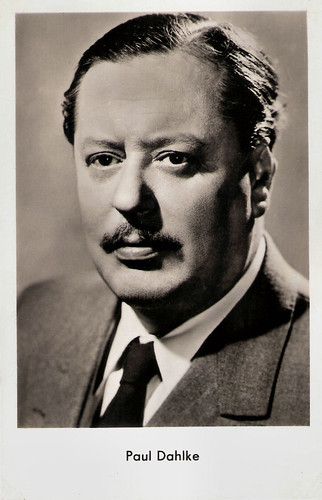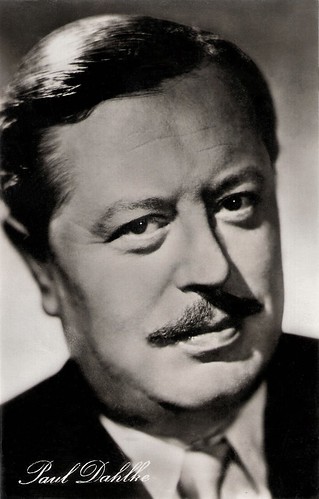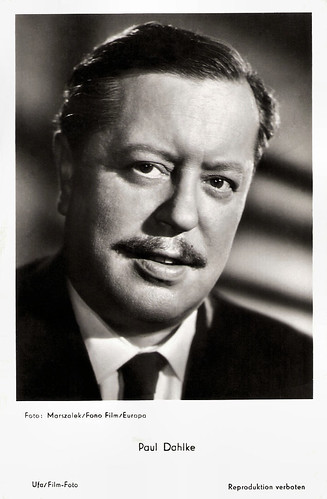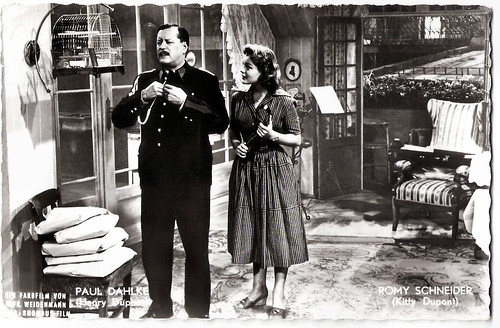German stage and film actor Paul Dahlke (1904-1984) appeared in dozens of German films of the 1930s, 1940s, 1950s and 1960s. He often played energetic characters and simple-minded souls. Dahlke was probably at his best in the witty comedies by Kurt Hoffmann during the 1950s.

East-German postcard by VEB Progress Filmvertrieb, Berlin, no. 244, 1956. Photo: Standard Film GmbH. Publicity still for Vergiss die Liebe nicht/Don't Forget Love (Paul Verhoeven, 1953).
Paul Victor Ernst Dahlke was born in 1904 in Gross Streitz, near Köslin, Imperial Germany (today Strzezenice, Poland). He visited schools in Köslin, Stargard and in Dortmund. Dahlke worked in the Dorstfeld coal mine during his last year in high school and after his graduation in 1922.
Dahlke then studied at the Clausthal-Zellerfeld’s Bergakademie (University of Technology) and at the Technische Hochschule Berlin-Charlottenburg (Technical University of Berlin). He also attended lectures in German studies and in theatre studies. It was only a small step to becoming an actor. From 1927 on, Dahlke attended Max-Reinhardt-Schule (Max Reinhardt's drama school).
In 1929, he performed in small roles at the Lessing Theatre and toured with a small travelling theatre before he performed on stage in Berlin and Munich. In 1931, Dahlke made his debut at the Deutsche Theater in a production of Ödön von Horváth’s 'Geschichten aus dem Wiener Wald' (Tales from the Vienna Woods).
During the following years, he performed in numerous roles at the famous theatre, in plays by Gerhardt Hauptmann and William Shakespeare. Dahlke worked at the Deutsche Theater till 1944. In 1937, he was awarded as a Staatsschauspieler.
In 1934, Dahlke made his film in the role of the Governor of a South Sea island in the melodrama Liebe, Tod und Teufel/The Devil in a Bottle (Heinz Hilpert, Reinhart Steinbicker, 1934). With his robust, stocky, and sturdy appearance, he often played energetic characters and simple-minded souls like the role of Ruprecht in Der zerbrochene Krug/The Broken Jug (Gustav Ucicky, 1937), starring Emil Jannings. He played supporting parts in the comedy Lady Windermeres Fächer/Lady Windermere's Fan (Heinz Hilpert, 1935) starring Lil Dagover, and the historical film Fridericus (Johannes Meyer, 1937) starring Otto Gebühr as Frederick II of Prussia.

East-German postcard by VEB Progress Filmvertrieb, Berlin, no. 36-276. Photo: MHD-Film / NF. Publicity still for Die tolle Lola/The Great Lola (Hans Deppe, 1954).

German postcard by Ufa, Berlin-Templehof, no. FK 2024. Photo: Marszalek / Fono Film / Europa. Publicity still for Meine Kinder und Ich/My Children and I (Wolfgang Schleif, 1955).
Paul Dahlke had a big part in the propaganda film Venus vor Gericht/Venus on Trial (Hans H. Zerlett, 1941) starring Hannes Stelzer and Hansi Knoteck. The film was part of the Nazi's campaign against degenerate art and depicts the trial of a young artist who has resisted the trend towards it.
Dahlke authentically portrayed quick-tempered as well as phlegmatic characters, for instance, the fussy and self-righteous accountant in Helmut Käutner’s Romanze in Moll/Romance in a Minor Key (1943). Lars Bellmann at IMDb: “This beautifully made film has a sensitive delicacy that is unusual for Third Reich cinema. The cast – directed by the brilliant Helmut Käutner – is outstanding.”
After World War II, Dahlke performed as an entertainer in Salzburg and in Bad Wildungen for the forces of the occupation armies. In 1946, Erich Engel brought him to Munich’s Kammerspiele.
From 1949 to 1953, Dahlke was a cast member of Munich's Staatstheater and embodied characters like Carl Zuckmayer's 'Des Teufels General' (The Devil’s General) and Professor Higgins in George Bernard Shaw's 'Pygmalion'. He subsequently performed as a freelance actor at numerous theatres throughout Germany.
In post-war cinema, Dahlke was soon designated to the roles of buoyant family fathers, such as in the comedy Krach im Hinterhaus/Trouble Backstairs (Erich Kobler, 1949) with Fita Benkhoff. He played Napoleon in the drama Begegnung mit Werther/Encounter with Werther (Karl-Heinz Stroux, 1949), starring Horst Caspar, and set around the writing of the novel The Sorrows of Young Werther by Johann Wolfgang von Goethe.

Dutch postcard. Photo: publicity still for Kitty und die grosse Welt/Kitty and the Great Big World (Alfred Weidenmann, 1956) with Romy Schneider.
Paul Dahlke could show his deadpan humour to advantage in film versions of novels by Erich Kästner, for instance, in the role of the mysterious teacher Justus in Das fliegende Klassenzimmer/Flying Classroom (Kurt Hoffmann, 1954), in the role of the eccentric millionaire Schlüter in Drei Männer im Schnee/Three Men in the Snow (Kurt Hoffmann, 1955), and in the role of Professor Kuckuck in the film version of Thomas Mann’s novel Bekenntnisse des Hochstaplers Felix Krull/Confessions of Felix Krull (Kurt Hoffmann, 1957), featuring Horst Buchholz.
He also played Christian Wolff’s father in Anders als du und ich (§175)/Different from You and Me (§175) (Veit Harlan, 1957), a feature film about homosexuality. The film was subject to censorship in Germany, and several scenes had to be altered before it could be released. Abroad, he appeared with John Forsythe and Rosanna Schiaffino in the Italian-Yugoslav historical period drama Il vendicatore/Dubrowsky (William Dieterle, 1959), based on the novel Dubrovsky by Alexander Pushkin.
During the 1960s he appeared opposite Heinz Rühmann in the comedy Das Haus in Montevideo/The House in Montevideo (Helmut Käutner, 1963), with Curd Jürgens in the French-West German drama Begegnung in Salzburg/Encounter in Salzburg (Max Friedmann, 1964), and in the comedy Die Heiden von Kummerow/The Heathens of Kummerow (Werner Jacobs, 1967), the first co-production between East and West Germany.
Dahlke also played in action films, such as the German-Italian crime drama Das Geheimnis der chinesischen Nelke/Secret of the Chinese Carnation (Rudolf Zehetgruber, 1964), and the West-German-Italian spy film Das Geheimnis der drei Dschunken/Red Dragon (Ernst Hofbauer, 1965) starring Stewart Granger. He also had a supporting part in the Hollywood comedy Situation Hopeless... But Not Serious (Gottfried Reinhardt, 1965) starring Alec Guinness and the young Robert Redford. When the cinema only offered him roles in light fare, Dahlke turned his focus to television and appeared in countless TV films. In the 1970s he became popular guest-starring in Krimi series like Der Kommissar (1974), Der Alte/The Old Fox (1980) and Derrick (1983). Dahlke was also the German dubbing voice of Charles Laughton and Vincent Price.
On TV, he often played grumpy old men, stubborn people like the grouchy Rhine skipper in Wolfgang Staudte’s TV series MS Franziska (1978) or the restive grandfather in the fall-out shelter farce Unternehmen Arche Noah (Konrad Sabrautzky, 1983) with Karin Baal. Dahlke won several awards during his long career. In 1974, he was awarded the Filmband in Gold and in 1979 the Great Cross of Merit. He was married to actress Elfe Gerhart. In 1984, Paul Dahlke died in Salzburg, Austria. He was 80.
Trailer for Sechs Stunden Angst/Six Hours Fear (Eugen York, 1964). Source: POLAR Film + Medien (YouTube).
Sources: Filmportal.de, Wikipedia and IMDb.
This post was last updated on 15 November 2023.

East-German postcard by VEB Progress Filmvertrieb, Berlin, no. 244, 1956. Photo: Standard Film GmbH. Publicity still for Vergiss die Liebe nicht/Don't Forget Love (Paul Verhoeven, 1953).
Energetic characters and simple-minded souls
Paul Victor Ernst Dahlke was born in 1904 in Gross Streitz, near Köslin, Imperial Germany (today Strzezenice, Poland). He visited schools in Köslin, Stargard and in Dortmund. Dahlke worked in the Dorstfeld coal mine during his last year in high school and after his graduation in 1922.
Dahlke then studied at the Clausthal-Zellerfeld’s Bergakademie (University of Technology) and at the Technische Hochschule Berlin-Charlottenburg (Technical University of Berlin). He also attended lectures in German studies and in theatre studies. It was only a small step to becoming an actor. From 1927 on, Dahlke attended Max-Reinhardt-Schule (Max Reinhardt's drama school).
In 1929, he performed in small roles at the Lessing Theatre and toured with a small travelling theatre before he performed on stage in Berlin and Munich. In 1931, Dahlke made his debut at the Deutsche Theater in a production of Ödön von Horváth’s 'Geschichten aus dem Wiener Wald' (Tales from the Vienna Woods).
During the following years, he performed in numerous roles at the famous theatre, in plays by Gerhardt Hauptmann and William Shakespeare. Dahlke worked at the Deutsche Theater till 1944. In 1937, he was awarded as a Staatsschauspieler.
In 1934, Dahlke made his film in the role of the Governor of a South Sea island in the melodrama Liebe, Tod und Teufel/The Devil in a Bottle (Heinz Hilpert, Reinhart Steinbicker, 1934). With his robust, stocky, and sturdy appearance, he often played energetic characters and simple-minded souls like the role of Ruprecht in Der zerbrochene Krug/The Broken Jug (Gustav Ucicky, 1937), starring Emil Jannings. He played supporting parts in the comedy Lady Windermeres Fächer/Lady Windermere's Fan (Heinz Hilpert, 1935) starring Lil Dagover, and the historical film Fridericus (Johannes Meyer, 1937) starring Otto Gebühr as Frederick II of Prussia.

East-German postcard by VEB Progress Filmvertrieb, Berlin, no. 36-276. Photo: MHD-Film / NF. Publicity still for Die tolle Lola/The Great Lola (Hans Deppe, 1954).

German postcard by Ufa, Berlin-Templehof, no. FK 2024. Photo: Marszalek / Fono Film / Europa. Publicity still for Meine Kinder und Ich/My Children and I (Wolfgang Schleif, 1955).
Sensitive delicacy
Paul Dahlke had a big part in the propaganda film Venus vor Gericht/Venus on Trial (Hans H. Zerlett, 1941) starring Hannes Stelzer and Hansi Knoteck. The film was part of the Nazi's campaign against degenerate art and depicts the trial of a young artist who has resisted the trend towards it.
Dahlke authentically portrayed quick-tempered as well as phlegmatic characters, for instance, the fussy and self-righteous accountant in Helmut Käutner’s Romanze in Moll/Romance in a Minor Key (1943). Lars Bellmann at IMDb: “This beautifully made film has a sensitive delicacy that is unusual for Third Reich cinema. The cast – directed by the brilliant Helmut Käutner – is outstanding.”
After World War II, Dahlke performed as an entertainer in Salzburg and in Bad Wildungen for the forces of the occupation armies. In 1946, Erich Engel brought him to Munich’s Kammerspiele.
From 1949 to 1953, Dahlke was a cast member of Munich's Staatstheater and embodied characters like Carl Zuckmayer's 'Des Teufels General' (The Devil’s General) and Professor Higgins in George Bernard Shaw's 'Pygmalion'. He subsequently performed as a freelance actor at numerous theatres throughout Germany.
In post-war cinema, Dahlke was soon designated to the roles of buoyant family fathers, such as in the comedy Krach im Hinterhaus/Trouble Backstairs (Erich Kobler, 1949) with Fita Benkhoff. He played Napoleon in the drama Begegnung mit Werther/Encounter with Werther (Karl-Heinz Stroux, 1949), starring Horst Caspar, and set around the writing of the novel The Sorrows of Young Werther by Johann Wolfgang von Goethe.

Dutch postcard. Photo: publicity still for Kitty und die grosse Welt/Kitty and the Great Big World (Alfred Weidenmann, 1956) with Romy Schneider.
Deadpan humour
Paul Dahlke could show his deadpan humour to advantage in film versions of novels by Erich Kästner, for instance, in the role of the mysterious teacher Justus in Das fliegende Klassenzimmer/Flying Classroom (Kurt Hoffmann, 1954), in the role of the eccentric millionaire Schlüter in Drei Männer im Schnee/Three Men in the Snow (Kurt Hoffmann, 1955), and in the role of Professor Kuckuck in the film version of Thomas Mann’s novel Bekenntnisse des Hochstaplers Felix Krull/Confessions of Felix Krull (Kurt Hoffmann, 1957), featuring Horst Buchholz.
He also played Christian Wolff’s father in Anders als du und ich (§175)/Different from You and Me (§175) (Veit Harlan, 1957), a feature film about homosexuality. The film was subject to censorship in Germany, and several scenes had to be altered before it could be released. Abroad, he appeared with John Forsythe and Rosanna Schiaffino in the Italian-Yugoslav historical period drama Il vendicatore/Dubrowsky (William Dieterle, 1959), based on the novel Dubrovsky by Alexander Pushkin.
During the 1960s he appeared opposite Heinz Rühmann in the comedy Das Haus in Montevideo/The House in Montevideo (Helmut Käutner, 1963), with Curd Jürgens in the French-West German drama Begegnung in Salzburg/Encounter in Salzburg (Max Friedmann, 1964), and in the comedy Die Heiden von Kummerow/The Heathens of Kummerow (Werner Jacobs, 1967), the first co-production between East and West Germany.
Dahlke also played in action films, such as the German-Italian crime drama Das Geheimnis der chinesischen Nelke/Secret of the Chinese Carnation (Rudolf Zehetgruber, 1964), and the West-German-Italian spy film Das Geheimnis der drei Dschunken/Red Dragon (Ernst Hofbauer, 1965) starring Stewart Granger. He also had a supporting part in the Hollywood comedy Situation Hopeless... But Not Serious (Gottfried Reinhardt, 1965) starring Alec Guinness and the young Robert Redford. When the cinema only offered him roles in light fare, Dahlke turned his focus to television and appeared in countless TV films. In the 1970s he became popular guest-starring in Krimi series like Der Kommissar (1974), Der Alte/The Old Fox (1980) and Derrick (1983). Dahlke was also the German dubbing voice of Charles Laughton and Vincent Price.
On TV, he often played grumpy old men, stubborn people like the grouchy Rhine skipper in Wolfgang Staudte’s TV series MS Franziska (1978) or the restive grandfather in the fall-out shelter farce Unternehmen Arche Noah (Konrad Sabrautzky, 1983) with Karin Baal. Dahlke won several awards during his long career. In 1974, he was awarded the Filmband in Gold and in 1979 the Great Cross of Merit. He was married to actress Elfe Gerhart. In 1984, Paul Dahlke died in Salzburg, Austria. He was 80.
Trailer for Sechs Stunden Angst/Six Hours Fear (Eugen York, 1964). Source: POLAR Film + Medien (YouTube).
Sources: Filmportal.de, Wikipedia and IMDb.
This post was last updated on 15 November 2023.
No comments:
Post a Comment